Babesiosis on the Rise in Maryland: What You Need to Know About This Tick-Borne Illness
When we talk about tick borne illness, Lyme disease usually takes center stage. But another serious infection is gaining ground—babesiosis, a disease that attacks red blood cells and is becoming increasingly common in Maryland and across the Mid-Atlantic.
What Is Babesiosis?
Babesiosis is caused by microscopic parasites that first infect rodents and are later transmitted to humans through the bite of infected blacklegged ticks, the same type of tick that spreads Lyme disease. Once in the bloodstream, the parasite targets red blood cells, leading to a range of symptoms and complications.
According to Dr. Nicole Baumgarth of the Lyme and Tickborne Diseases Research and Education Institute at Johns Hopkins, babesiosis can also be transmitted through blood transfusions, making routine blood screening especially important. “Unfortunately, this disease can be subclinical,” says Dr. Baumgarth, meaning people might not know they’re infected and could unknowingly donate contaminated blood.
A Growing Threat in the Mid-Atlantic
Historically, babesiosis cases were largely found in the Northeast and Midwest, but new research shows a noticeable uptick in Maryland and surrounding states. One possible reason? Climate change. Warmer temperatures are extending the active season for ticks and expanding their geographic range—bringing babesiosis to new regions.
Symptoms and Why Early Detection Matters
Babesiosis can resemble the flu, with symptoms like:
Fever and chills
Muscle and joint aches
Fatigue
Headache
If left untreated, especially in people with weakened immune systems, babesiosis can become much more severe—leading to anemia, jaundice, or even organ failure.
The Good News: It’s Treatable
Much like Lyme disease, babesiosis is treatable, especially when caught early. Antiparasitic medications and antibiotics are typically used together to clear the infection. But early detection is key, which is why awareness, prevention, and tick checks are more important than ever.
What Lyme Warriors Should Do
If you live in or travel to Maryland, Delaware, Virginia, or other parts of the Mid-Atlantic, be aware that you’re at increased risk not just for Lyme disease, but also for babesiosis. Protect yourself and your loved ones by:
Doing regular tick checks after spending time outdoors
Wearing long sleeves and pants in wooded or grassy areas
Using tick repellents
Talking to your doctor if you develop flu-like symptoms after a tick bite
At Lyme Warrior, we're committed to helping you stay informed and empowered in the fight against tickborne disease. We’ll continue to monitor the latest research and keep you up to date on how to protect yourself, and what to watch out for as tick-related threats evolve. Read more about Babesiosis here.


